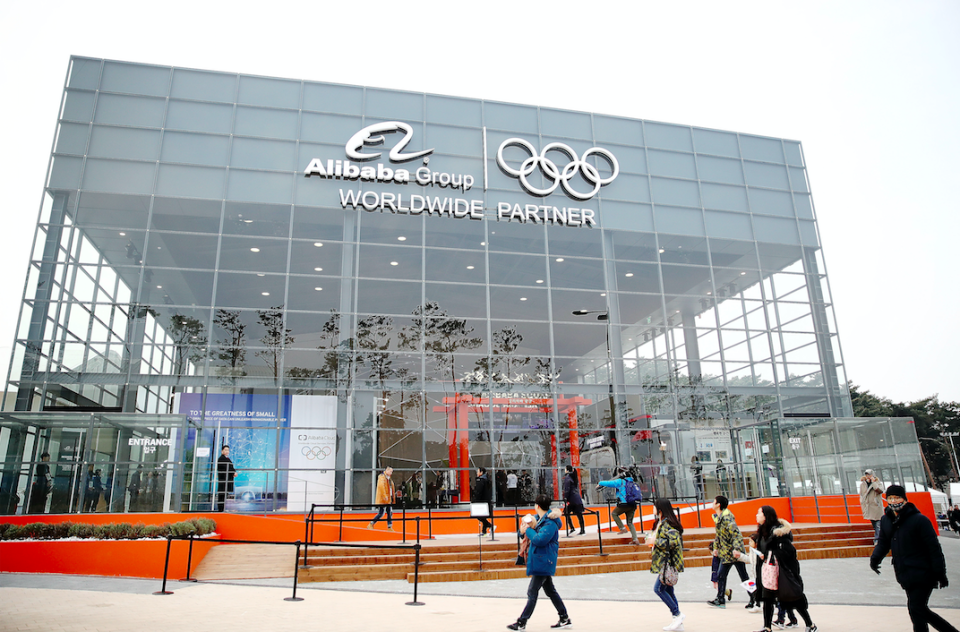With the Olympics, Alibaba is making a big global push

Chinese e-commerce giant Alibaba (BABA) is taking the global stage at this year’s Winter Olympics in PyeongChang.
A year ago, Alibaba and the International Olympic Committee announced that Alibaba would join The Olympic Partner (TOP) program, the highest sponsorship level, and stay on through 2028. Alibaba joins the likes of 12 other corporate giants including Coca-Cola (KO), Intel (INTC), and Procter & Gamble (PG).
Alibaba’s shopping platforms, Tmall and Taobao, are well-known in China, but they’re not as familiar in the U.S. and other parts of the world. Partnering with the Olympics can help change that.
Ahead of the games, Alibaba unveiled its first global advertising campaign with a theme of “the greatness of small.” The series of video ads have garnered millions of views since their debut.
“What we really care about is small businesses and young people and leveling the playing field through the use of technology to allow these people to participate in the global economy,” Alibaba’s president and Olympic gold medalist Mike Evans told Yahoo Finance in a telephone call from South Korea. “Of course, what the Olympic movement, what the IOC really cares about, is the participation of all nations and athletes in a sporting event where everyone gets to come and there’s no determination at the beginning about who will win. So again, leveling the playing field for maximum participation and providing the opportunity for everybody.”
Being a top sponsor opens up the company to more brand recognition and awareness on a global scale.
“At a very basic, but very important level, is [the] branding and the visibility of our organization is going global. And that is completely consistent with [founder and executive chairman] Jack [Ma’s] vision for globalization of our firm,” Evans said. “The real question is, ‘What will we actually be doing? And what is what is the real mission? How will people be able to see what it is we’re doing?’”
Alibaba offers a platform for small businesses and large brands to sell their products to the nearly 500 million buyers across its sites. Alibaba itself does not sell a product.
“We don’t have things that people will buy from us,” Evans said. “So what we’re very focused on is the digitalization of the game and the technology and the innovation that’s required to do that.”
The Olympics rely on corporate sponsorship dollars, but they also need the services of companies like Alibaba. For its part, Alibaba is tasked with cloud and e-commerce platform services.

At this year’s games, Alibaba is showcasing how its technology, including artificial intelligence and cloud computing, could transform the Olympic experience and bring it into the digital era. Alibaba is also a founding partner of the Olympic Channel, an internet television channel started by the IOC.
“People love sports everywhere in the world,” Evans said. “So you still have 3.5 billion people not watching the Olympics. We want to help through the digitalization of the Olympic movement want to help provide that opportunity to anybody who’s got a mobile phone the television whatever form of instrument they want to use.”
Alibaba believes that its mission of connecting businesses and giving them access to new markets aligns with the Olympics, which offers a platform for athletes all around the world to compete.
“Alibaba considers itself to be an enabler of small businesses who are the underdogs,” Evans said. “And Jack Ma has often talked about the dominance of 60,000 multinational corporations over the last 50 or 60 years in the global economy and what we believe — and we’re seeing it happen — is that in the next 30 to 50 years millions and millions of small businesses around the world, connected through technology and enabled by logistics and payments cloud services, will need to sell their products in markets that they never envisioned possible. And therefore, they will become more included in the global economy and be able to make a contribution. Those are the underdogs today.”
Evans, who himself was once considered an underdog, was a member of the gold medal-winning Canadian men’s eight rowing team in the 1984 Summer Olympics in Los Angeles. This year, he ran with the Olympic torch on behalf of Alibaba.
Julia La Roche is a finance reporter at Yahoo Finance. Follow her on Twitter.

